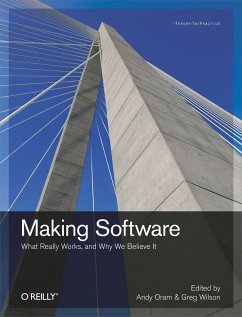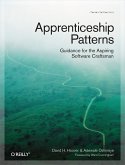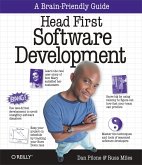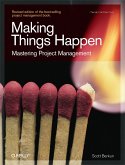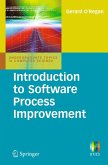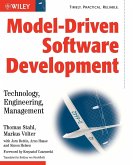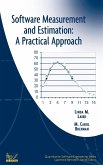We've all heard claims of tools, technologies and practices that "improve" software development. The majority of these claims are not based on evidence, but rather anecdote and opinion.
For example, many programmers will state that their preferred programming language is more expressive, easier to learn tan others but when pressed can not back up their claim. DSLs are said to improve productivity but is there proof of this?
Leading developers including Steve McConnell, Barry Boehm and Tom Ostrand uncover the truths and identify commonly believed myths in the software development community.
Contributions include:
- Walter Tichy answers the question: does using design patterns make code better?
- Tom Ostrand: where do bugs really come from?
- Steve McConnell: What do we know about productivity differences among working programmers?
- Laurie Williams: Is pair programming really more efficient?
By understanding the difference between evidence-based facts and opinion based findings, programmers will be better equipped to determine what tools, technologies and best practices are right for their needs.
Many claims are made about how certain tools, technologies, and practices improve software development. But which claims are verifiable, and which are merely wishful thinking? In this book, leading thinkers such as Steve McConnell, Barry Boehm, and Barbara Kitchenham offer essays that uncover the truth and unmask myths commonly held among the software development community. Their insights may surprise you.
Are some programmers really ten times more productive than others?
Does writing tests first help you develop better code faster?
Can code metrics predict the number of bugs in a piece of software?
Do design patterns actually make better software?
What effect does personality have on pair programming?
What matters more: how far apart people are geographically, or how far apart they are in the org chart?
Contributors include:
Jorge Aranda
Tom Ball
Victor R. Basili
Andrew Begel
Christian Bird
Barry Boehm
Marcelo Cataldo
Steven Clarke
Jason Cohen
Robert DeLine
Madeline Diep
Hakan Erdogmus
Michael Godfrey
Mark Guzdial
Jo E. Hannay
Ahmed E. Hassan
Israel Herraiz
Kim Sebastian Herzig
Cory Kapser
Barbara Kitchenham
Andrew Ko
Lucas Layman
Steve McConnell
Tim Menzies
Gail Murphy
Nachi Nagappan
Thomas J. Ostrand
Dewayne Perry
Marian Petre
Lutz Prechelt
Rahul Premraj
Forrest Shull
Beth Simon
Diomidis Spinellis
Neil Thomas
Walter Tichy
Burak Turhan
Elaine J. Weyuker
Michele A. Whitecraft
Laurie Williams
Wendy M. WilliamsAndreas Zeller
Thomas Zimmermann
Hinweis: Dieser Artikel kann nur an eine deutsche Lieferadresse ausgeliefert werden.
For example, many programmers will state that their preferred programming language is more expressive, easier to learn tan others but when pressed can not back up their claim. DSLs are said to improve productivity but is there proof of this?
Leading developers including Steve McConnell, Barry Boehm and Tom Ostrand uncover the truths and identify commonly believed myths in the software development community.
Contributions include:
- Walter Tichy answers the question: does using design patterns make code better?
- Tom Ostrand: where do bugs really come from?
- Steve McConnell: What do we know about productivity differences among working programmers?
- Laurie Williams: Is pair programming really more efficient?
By understanding the difference between evidence-based facts and opinion based findings, programmers will be better equipped to determine what tools, technologies and best practices are right for their needs.
Many claims are made about how certain tools, technologies, and practices improve software development. But which claims are verifiable, and which are merely wishful thinking? In this book, leading thinkers such as Steve McConnell, Barry Boehm, and Barbara Kitchenham offer essays that uncover the truth and unmask myths commonly held among the software development community. Their insights may surprise you.
Are some programmers really ten times more productive than others?
Does writing tests first help you develop better code faster?
Can code metrics predict the number of bugs in a piece of software?
Do design patterns actually make better software?
What effect does personality have on pair programming?
What matters more: how far apart people are geographically, or how far apart they are in the org chart?
Contributors include:
Jorge Aranda
Tom Ball
Victor R. Basili
Andrew Begel
Christian Bird
Barry Boehm
Marcelo Cataldo
Steven Clarke
Jason Cohen
Robert DeLine
Madeline Diep
Hakan Erdogmus
Michael Godfrey
Mark Guzdial
Jo E. Hannay
Ahmed E. Hassan
Israel Herraiz
Kim Sebastian Herzig
Cory Kapser
Barbara Kitchenham
Andrew Ko
Lucas Layman
Steve McConnell
Tim Menzies
Gail Murphy
Nachi Nagappan
Thomas J. Ostrand
Dewayne Perry
Marian Petre
Lutz Prechelt
Rahul Premraj
Forrest Shull
Beth Simon
Diomidis Spinellis
Neil Thomas
Walter Tichy
Burak Turhan
Elaine J. Weyuker
Michele A. Whitecraft
Laurie Williams
Wendy M. WilliamsAndreas Zeller
Thomas Zimmermann
Hinweis: Dieser Artikel kann nur an eine deutsche Lieferadresse ausgeliefert werden.

